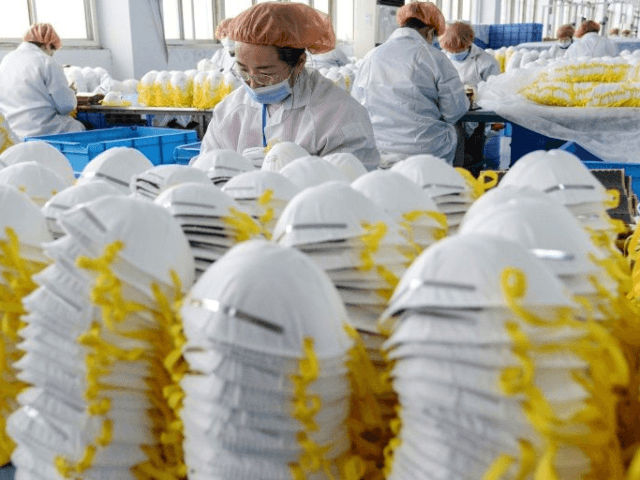The South China Morning Post (SCMP) reported on Wednesday that, despite copious promises by the Chinese government to crack down on scammers and con artists, they are still preying upon foreign governments and private citizens desperate to buy masks and other protective equipment to combat the Wuhan coronavirus.
China has long been the world’s largest producer of such equipment. The current state of the Chinese marketplace was described by knowledgeable observers as sheer chaos:
Desperate buyers, many with little experience of doing business in China, have scrambled to secure medical protective equipment at astronomical prices. Export restrictions that appear to change with the wind have confounded customs workers and scuttled shipments.
And con artists in China have fed off the frenzy with promises to source medical goods they cannot or will not deliver. To lure overseas buyers into making a purchase, they often make seductive sales pitches, claim false connections with legitimate medical manufacturers, flaunt authentic-looking paperwork and guarantee a speedy passage through customs.
Michael Crotty, whose Shanghai-based firm Golden Pacific Fashion & Design is making face masks for export, said the “chaos and dysfunction is hard to describe”.
The SCMP investigated the situation by sending reporters to pose as buyers of protective masks, hazmat suits, coronavirus test kits, and other supplies. They found shady characters lurking at every level of the Chinese market pushing dubious products and brandishing fraudulent certifications.
One outfit investigated by the SCMP appeared to have borrowed an unrelated person’s home address in Australia as the nominal location of its “temporary warehouse,” to the great consternation of the woman who lived there. Confronted with this and other sketchy details of his operation, the suspected con man – who claimed he could deliver an improbably large number of ventilators for coronavirus patients – spouted some slogans popularized by Chinese dictator Xi Jinping and then stopped communicating with the reporters.
The SCMP said most legitimate sources of hot coronavirus equipment have backorders stretching into the winter, so desperate buyers are taking more chances on dodgy operations pushing low-quality products. Phony paperwork, false claims of ties to legitimate manufacturers, and special deals involving large sums of cash upfront have become common. The reporters said eight of the nine suppliers they investigated “provided documentation made out to different companies” when asked for their bona fides.
The general sense conveyed by market experts who spoke with the SCMP is that buyers are so desperate to get their hands on coronavirus supplies that they are taking gambles on sources they know are dicey and allowing themselves to be shaken down for exorbitant prices.
The Chinese Communist government is perpetually promising to crack down on scam operations, but Beijing’s efforts to date fall short of those promises and have made the market worse in some ways:
After European buyers complained about defective products, China in April tightened export controls on a range of PPE goods. This further roiled medical-goods supply chains, creating confusion at customs and delaying shipments of much-needed cargo.
Buyers, freight forwarders and legal professionals have been “befuddled” by vague wording and contradictory information in new export rules, [U.S.-based lawyer Steve] Dickinson said.
“[They] put a range of legitimate steps on parties who were exporting, instead of just having it as a free-for-all,” said Nigel Blair, the head of Nihao Global, which has launched a vetted online marketplace for Chinese medical supplies.
The market, however, was still rife with “bootleggers” trying to take advantage of the crisis, he added.
China’s “gold rush” in mask production as the Wuhan coronavirus spread across the globe inspired over 38,000 companies to register as suppliers, overwhelming the ability of overseas buyers and regulatory agencies to tell good companies from bad. Some of the quality issues appear to stem from factory equipment that was hastily repurposed to create masks instead of other goods, using lower-grade material that was acquired for other purposes.
Faulty medical equipment from Chinese suppliers has caused huge problems for buyers in Canada, Spain, the Czech Republic, the United Kingdom, Turkey, and the Netherlands, among others. The Chinese Communist Party has dismissed complaints about low-quality masks by blaming the victims for dealing with unlicensed suppliers, or in one notorious case, accusing the customers of using the defective equipment improperly.

COMMENTS
Please let us know if you're having issues with commenting.